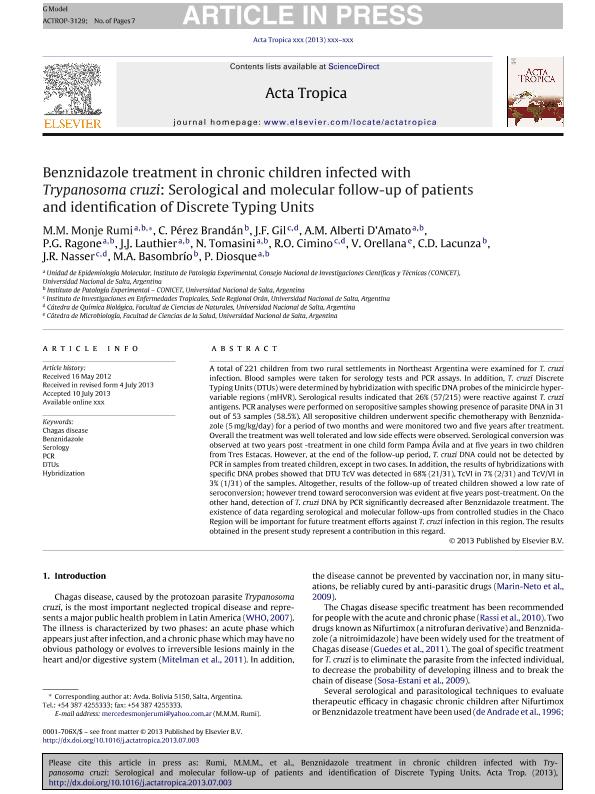Artículo
Benznidazole treatment in chronic children infected with Trypanosoma cruzi: Serological and molecular follow-up of patients and identification of Discrete Typing Units
Monje Rumi, Maria Mercedes ; Pérez Brandan, Cecilia María
; Pérez Brandan, Cecilia María ; Gil, José Fernando
; Gil, José Fernando ; Alberti D'amato, Anahí Maitén; Ragone, Paula Gabriela
; Alberti D'amato, Anahí Maitén; Ragone, Paula Gabriela ; Lauthier, Juan José
; Lauthier, Juan José ; Tomasini, Nicolás
; Tomasini, Nicolás ; Cimino, Rubén Oscar
; Cimino, Rubén Oscar ; Orellana, Viviana; Lacunza, Carlos Diego; Nasser, Julio Rubén; Basombrío, Miguel Ángel Manuel
; Orellana, Viviana; Lacunza, Carlos Diego; Nasser, Julio Rubén; Basombrío, Miguel Ángel Manuel ; Diosque, Patricio
; Diosque, Patricio
 ; Pérez Brandan, Cecilia María
; Pérez Brandan, Cecilia María ; Gil, José Fernando
; Gil, José Fernando ; Alberti D'amato, Anahí Maitén; Ragone, Paula Gabriela
; Alberti D'amato, Anahí Maitén; Ragone, Paula Gabriela ; Lauthier, Juan José
; Lauthier, Juan José ; Tomasini, Nicolás
; Tomasini, Nicolás ; Cimino, Rubén Oscar
; Cimino, Rubén Oscar ; Orellana, Viviana; Lacunza, Carlos Diego; Nasser, Julio Rubén; Basombrío, Miguel Ángel Manuel
; Orellana, Viviana; Lacunza, Carlos Diego; Nasser, Julio Rubén; Basombrío, Miguel Ángel Manuel ; Diosque, Patricio
; Diosque, Patricio
Fecha de publicación:
10/2013
Editorial:
Elsevier Science
Revista:
Acta Tropica
ISSN:
0001-706X
Idioma:
Inglés
Tipo de recurso:
Artículo publicado
Clasificación temática:
Resumen
A total of 221 children from two rural settlements in Northeast Argentina were examined for T. cruzi infection. Blood samples were taken for serology tests and PCR assays. In addition, T. cruzi Discrete Typing Units (DTUs) were determined by hybridization with specific DNA probes of the minicircle hypervariable regions (mHVR). Serological results indicated that 26% (57/215) were reactive against T. cruzi antigens. PCR analyses were performed on seropositive samples showing presence of parasite DNA in 31 out of 53 samples (58.5%). All seropositive children underwent specific chemotherapy with Benznidazole (5mg/kg/day) for a period of two months and were monitored two and five years after treatment. Overall the treatment was well tolerated and low side effects were observed. Serological conversion was observed at two years post -treatment in one child form Pampa Ávila and at five years in two children from Tres Estacas. However, at the end of the follow-up period, T. cruzi DNA could not be detected by PCR in samples from treated children, except in two cases. In addition, the results of hybridizations with specific DNA probes showed that DTU TcV was detected in 68% (21/31), TcVI in 7% (2/31) and TcV/VI in 3% (1/31) of the samples. Altogether, results of the follow-up of treated children showed a low rate of seroconversion; however trend toward seroconversion was evident at five years post-treatment. On the other hand, detection of T. cruzi DNA by PCR significantly decreased after Benznidazole treatment. The existence of data regarding serological and molecular follow-ups from controlled studies in the Chaco Region will be important for future treatment efforts against T. cruzi infection in this region. The results obtained in the present study represent a contribution in this regard.
Palabras clave:
Benznidazole
,
Chagas disease
,
DTUs
,
Hybridization
,
PCR
,
Serology
Archivos asociados
Licencia
Identificadores
Colecciones
Articulos(CCT - SALTA-JUJUY)
Articulos de CTRO.CIENTIFICO TECNOL.CONICET - SALTA-JUJUY
Articulos de CTRO.CIENTIFICO TECNOL.CONICET - SALTA-JUJUY
Citación
Monje Rumi, Maria Mercedes; Pérez Brandan, Cecilia María; Gil, José Fernando; Alberti D'amato, Anahí Maitén; Ragone, Paula Gabriela; et al.; Benznidazole treatment in chronic children infected with Trypanosoma cruzi: Serological and molecular follow-up of patients and identification of Discrete Typing Units; Elsevier Science; Acta Tropica; 128; 1; 10-2013; 130-136
Compartir
Altmétricas



